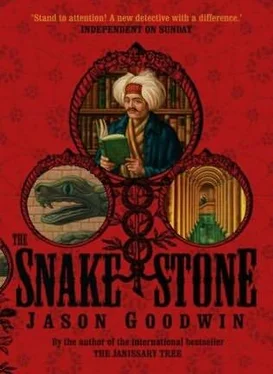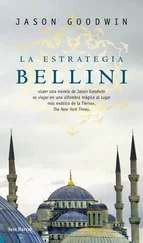Jason Goodwin - The snake stone
Здесь есть возможность читать онлайн «Jason Goodwin - The snake stone» весь текст электронной книги совершенно бесплатно (целиком полную версию без сокращений). В некоторых случаях можно слушать аудио, скачать через торрент в формате fb2 и присутствует краткое содержание. Жанр: Исторический детектив, на английском языке. Описание произведения, (предисловие) а так же отзывы посетителей доступны на портале библиотеки ЛибКат.
- Название:The snake stone
- Автор:
- Жанр:
- Год:неизвестен
- ISBN:нет данных
- Рейтинг книги:4 / 5. Голосов: 1
-
Избранное:Добавить в избранное
- Отзывы:
-
Ваша оценка:
- 80
- 1
- 2
- 3
- 4
- 5
The snake stone: краткое содержание, описание и аннотация
Предлагаем к чтению аннотацию, описание, краткое содержание или предисловие (зависит от того, что написал сам автор книги «The snake stone»). Если вы не нашли необходимую информацию о книге — напишите в комментариях, мы постараемся отыскать её.
The snake stone — читать онлайн бесплатно полную книгу (весь текст) целиком
Ниже представлен текст книги, разбитый по страницам. Система сохранения места последней прочитанной страницы, позволяет с удобством читать онлайн бесплатно книгу «The snake stone», без необходимости каждый раз заново искать на чём Вы остановились. Поставьте закладку, и сможете в любой момент перейти на страницу, на которой закончили чтение.
Интервал:
Закладка:
“Whassat? What’ya talking about?” He hoped he sounded drunk.
“I talks about a book, mister. Is little. Black. Is not belong to you, you understand? But we make it all right. Give me the book, and go your ways.”
Yashim’s hand went to his chest. Lefevre’s book was not there.
“Who are you?” he said thickly.
“Please. The book, only.”
The caique gave a little lurch, and there was a metallic click. Something winked momentarily in the darkness.
“What worth your life, efendi?”
It would be very soon. There was little time.
Yashim sat up. He put his hand out for support and brushed against the man’s fingers where they clutched the rim of his caique.
When one is getting into a caique held firmly against a fixed landing stage or piling by the oarsman, it is possible to stand up for a few seconds.
In open water, when there is nothing to steady the boat and the oarsman is unprepared, you do not have seconds. You have maybe one.
Yashim stood up.
He stepped forward and stamped down, hard.
There was a crack, and the caiques dipped together. As the hull of his caique flipped upward, Yashim took a step back and kicked himself off into the water.
He flicked the water out of his eyes and released his cloak, letting it float. He brushed the white turban from his head: it could catch the faint light, and he let it go. With his head above the water, he concentrated on staying afloat as silently as possible while three men floundered, cursing, close at hand. Yashim took the hem of his cloak in his teeth and paddled gently backward; the cloak would protect him and give him warning if someone tried to grab him in the dark.
He could hear the men more clearly now. One of them was cursing: perhaps the man whose hand he had trodden on. Another was lamenting the loss of his oars. Someone eventually told him to shut up.
With their caiques gone, the men would have to strike out for the shore. The Pera side was slightly closer; they would probably swim that way. Yashim went on quietly paddling until he heard them splashing, and then he released the cloak and turned onto his front. He swam breast stroke, not trying to fight the current that was bearing him slowly down toward the Bosphorus.
About twenty minutes later, a pair of barefooted chairmen enjoying a quiet smoke outside the New Mosque were surprised to be hailed by a man who squelched toward them out of the darkness. It was a shame the man was so wet, but he doubled their usual fare to the Fener baths. Business had been pretty quiet all evening.
47
The curtains of muslin and silk brushed together, stirred like a breath by the night air. Sometimes he could see a tiny diadem of stars through a chink close up by the rail, and it came and went, came and went, the way people did when you were dying, looking in to observe the progress of death, to render a report on the invisible struggle; all that was left. The sultan wondered if this was the way all men died, alone, in doubt, troubled by memories.
He listened to the breath in the room, the woman’s breathing, the shush of the muslin against the silk. This would, of course, go on: the world would breathe without him. His own breath was less; it made no sound; he barely moved. Now that a great sleep was drawing close, he no longer needed sleep. The rehearsals were over.
Out on the water, something splashed. The Bosphorus was full of fish. He imagined himself gliding with them, their cool, metallic bodies holding level, the moonlight refracted through the surface of the water, cold and silvery, and the fish glinting like the stars.
He swam with them easily, borne along by the current and an effort that was minute, imperceptible. Hadn’t they always been there, too? Waiting for him-or perhaps not him, especially: for anyone who was ready to come, that night, any night.
He looked ahead; it seemed that his eye skimmed like a shearwater across the dark ripples, zigzagging between the headlands where the hill ridges dropped to the water’s edge.
On to where the straits opened out into the restless sea.
48
Marta half turned with the tray in her hands and nudged the door open with a sway of her hip. Inside, the room was almost dark, and only a thin crack of light between the shutters showed that the morning was well advanced. Palewski’s room smelled strongly of candle wax and brandy, a smell that Marta associated with her employer and which she had never learned to properly dislike. The table, she knew, would be piled with books and glasses, so she set the tray down on the floorboards and went to open the shutters she had closed on Palewski and his studies the night before.
Daylight poured into the room, and the bedclothes stirred and groaned.
Marta tugged at the window frame and succeeded in opening it about two inches at the top. For a few moments she stood looking out into the yard. Suela, the Xanis’ daughter, was sweeping the ground with a little besom broom; Shpetin, her brother, played silently in the dirt, rolling a ball to and fro. Marta sighed.
She cleared a space on the chair by the bed, moved the tray to it, and set about collecting the bottles and glasses, returning the candlesticks to the mantelpiece. She was very careful not to disturb any of the books scattered around the bed. The ambassador was a magnificent scholar, after all. Night after night he wearied himself looking into those books of his, and she knew better than to let her carelessness spoil his work. What made his work all the harder was that he possessed so many books, more than anyone had ever seen in their life, so that finding the thing he needed was a real chore.
“A Greek came round earlier,” she said, passing a cup of tea to the hand which had emerged from beneath the bedclothes. Marta, who was Greek herself, invested the word with powerful contempt. “I told him that you did not admit callers, but he could write and make an appointment.”
Palewski swam up from the duvet and sipped weakly on his tea. “Very good,” he mumbled. “Probably some sort of swindle.”
Marta nodded. That was it, exactly. The man had looked like a swindler.
“The water is weak again today,” she said.
“Tea’s all right, though.” Palewski put out his cup, and she filled it from the pot. “Thank you, Marta. I can manage now.”
Marta curtsied. Inwardly, she could not resist a smile. The ambassador was a clever man, to be sure; but to manage-no. Beyond his books he was simply a big child.
“Thank you, sir,” she said.
“Thank you, Marta.”
When Marta had gone, Palewski leaned from the bed and groped around on the floor. One of Lefevre’s handwritten notes had fluttered out of the book as he lay reading the night before. He had read it twice before he understood what it was; then he had very quickly snuffed out the candles and rolled up in bed.
Now he opened the book again, and in the cooler light of day he reread the paper. Serp. Column. Mehmet II hurled mace-broke off one jaw. Patriarch of H.S. aghast. “This ancient and illustrious talisman was erected here for the purpose of driving serpents from Constantinople and, in the event of its destruction, it is most probable that the city will be destroyed by an invasion of serpents.” Sultan desists. Heads broken off c. 1700; Polish noble.??? query. The word serpents was underlined. Palewski’s legs stirred uneasily beneath the featherbed.
49
“Permission to enter?” Yashim stood at the gates, peering around at the children in the yard. The little girl-what was her name? — looked up and gave him a brief smile, but Shpetin tucked his chin into his chest and stared sullenly at the ground.
“Don’t shoot-it’s only me,” Yashim said brightly as he crossed the yard.
Читать дальшеИнтервал:
Закладка:
Похожие книги на «The snake stone»
Представляем Вашему вниманию похожие книги на «The snake stone» списком для выбора. Мы отобрали схожую по названию и смыслу литературу в надежде предоставить читателям больше вариантов отыскать новые, интересные, ещё непрочитанные произведения.
Обсуждение, отзывы о книге «The snake stone» и просто собственные мнения читателей. Оставьте ваши комментарии, напишите, что Вы думаете о произведении, его смысле или главных героях. Укажите что конкретно понравилось, а что нет, и почему Вы так считаете.












